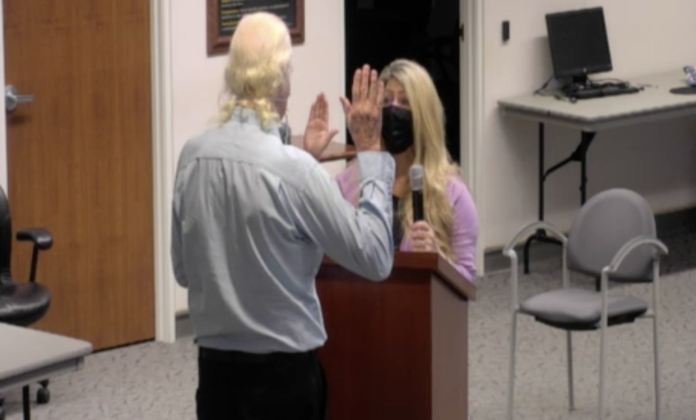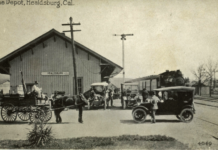At the June 2 meeting on the Windsor Town Council, the door was closed on the local political career of former mayor Dominic Foppoli, but it was clear there is still a deep political divide in the town that will continue for some time, as Vice Mayor Sam Salmon was appointed mayor, but plans to fill his seat ended in a deadlock with the council in stalemate.
With Foppoli’s resignation from the position of at-large mayor following weeks of allegations of sexual assault that go nearly two decades years, the council has been getting by with just three members — Salmon who stepped up to mayoral duties when Foppoli became indisposed, and councilmembers Esther Lemus and Debora Fudge.
A special election was already underway to fill Foppoli’s vacated town council seat (because of his November election to the mayor position) well before the allegations surfaced, and that election, which took place last month, was won decisively by Rosa Reynoza.
The June 2 meeting opened with the election being certified and Reynoza being sworn in as a council member. After she was seated, and the council worked through the early agenda — proclamations, town events, the consent calendar, including the formal acceptance of Foppoli’s resignation — they had to face the first big hurdle, how to replace Foppoli as mayor.
Because of the town’s move to district elections, the person taking over must be the at-large mayor for the remainder of the mayoral term that ends in December of 2022. The options before the council were to appoint someone (either a sitting town council member or a “qualified individual”) or to call for a special election.
The numerous public comments received via phone and over email showed a preference for a special election, though should there be an appointment the feedback overwhelmingly indicated the desire for Reynoza to be appointed mayor.
However, there were also several comments that did express concern about Reynoza’s lack of experience compared to Salmon, an elder stateman of the council who has served for more than 25 years and who has guided the recent town meetings with a kind and steady hand since Foppoli stepped away.
Multiple former candidates for council and mayor — Oscar Chavez, Tanya Potter, Julia Donoho and Jeffrey Leasure — called in to throw their hats in the ring for appointment.
Following public comment, the council began its own deliberations, with Reynoza starting off by saying she “would be honored” to be the new Windsor mayor and wished to be appointed. She also added that she would suggest her vacant council seat then be filled by Potter, who finished third in the mayoral race in November behind Foppoli and Reynoza.
Lemus came next, in a reversal from an earlier vote in favor of a special election, to state she was in favor of appointing a mayor, namely Salmon.
“I am going to support the appointment of a mayor instead of special election … I believe that we need to get back to business. I think it’s important for the town, for our employees, they’ve had a lot of upheaval and I can certainly understand that it’s taxing on everyone,” she said. “But, I do think we need to move forward and not go into … the cycle of multiple special elections … I will support Sam Salmon for that. Rosa, you have a lot of support, but my position is that Sam is the most senior person on this body. He has 25 plus years of experience and is the right decision to lead us going forward. He’s calm and collected; I know he’s been running the last several meetings in a gracious manner, and he can be a unifying person for the town.”
Lemus added that she sees the current election system of four districts and an at-large mayor as having a structural issue. She also reminded viewers that while she had voted for a special election to fill Foppoli’s seat, she also said at the time that she did not view that vote as precedent-setting and that most vacancies are filled by appointment.
Fudge echoed much of what Lemus said about Salmon and added her endorsement.
“Sam has risen to the occasion, he’s led with respect — that’s the only word I’d add to what Esther said. It’s not a political decision, it’s about what’s best for the whole town including staff … I think the best thing for the whole town, including staff and all of us, is to appoint Sam Salmon mayor,” she said.
Salmon spoke last and was solemn in his assessment. “This is not a joyous occasion here tonight. I think we all heard loud and clear from folks that support Rosa and support her for the right reasons … I voted for her, I don’t believe in endorsements so I didn’t endorse her, but I did vote for her,” he said. “We talk about a lot of experience, I’ve sat on this council a long time, and it’s something to hang my hat on. I’ve worked with every manager the town has ever had, which is pretty amazing, … I’m going to seemingly accept this nomination and take a vote and I will serve as mayor.
“I’m grateful to the council and I know that I’ll hear from all of you in the audience tonight. I would indicate to Rosa that I hope it would give her the ability to really dig into the council issues. One thing you learn when you become an elected, you change a bit, because you are no longer talking but listening and it’s a different position … everyone has an opinion and everyone is right.”
Reynoza interjected that she wanted to make it clear before the vote that she thought Salmon would “do a great job” as mayor but that she would be voting “for the people.”
“It isn’t anything personal against you,” she said.
Lemus then made the formal motion to nominate Salmon, which was seconded by Fudge, with the two of them plus Salmon voting in favor, and Reynoza voting against for a final tally of 3-1.
After Salmon was sworn in as mayor and then returned to try to determine who would then fill Salmon’s now vacated council seat. Consensus here was much less clear, with the options of appointment or special election showing a division that runs through both the council and the town.
Lemus and Fudge both supported appointing Chavez to the seat, as he finished second in the most recent special election and has been known to both of them, especially Lemus, who has known him for over 15 years and has worked with him professionally.
“He has always been a highly-respected leader in the community and I also had the opportunity to work with him on the school board. There is a lot of misperceptions out there and quite unfair judging of Oscar. People don’t know him and haven’t given him a chance. He’s a lifelong public servant — he started his career in the nonprofit sector with Community Action Partnership now has leadership role (in the county) … He is a man of integrity and the right temperament to join this body.”
Chavez’ candidacy appears to have been tainted by the political action committee that was formed to help fund his campaign and perception among residents that he has too close a tie to current council members and developers.
Reynoza stated that she didn’t know Chavez and that residents were speaking out about his campaign donations, and that this was an opportunity to “listen to the people.” She stated that her preference would be for a special election, but that if appointment was the decision her vote would go for Potter.
Salmon stated that in general he’s in favor of a special election, but if he had to appoint he would pick Leasure, who finished 22 votes behind Chavez. He pitched having Leasure, Potter and Chavez come back and answer questions at the next meeting, but Reynoza objected to that, based on the fact that the pool would be limited to those three. Fudge also protested as she expressed a desire to get the town moving forward and settled.
However, with no consensus reached (Lemus nominated and Fudge seconded an appointment for Chavez, but it ended in a stalemate with Reynoza and Salmon both voting no), the discussion will get kicked to the next board meeting anyway, though Reynoza blocked any attempt to bring back the three discussed.
The decision now becomes something of a race against the clock. According to town clerk Maria De La O, the council has until July 23 to either appoint someone or call for a special election. However, if they want to try to piggyback onto the November special election to save on costs, they must do it by July 11. That leaves two meetings — June 16 and July 7 — for the decision to be made. If the stalemate persists until July 23, then it automatically goes to a special election with a date to be determined after the November election, at a greater cost to the town.









